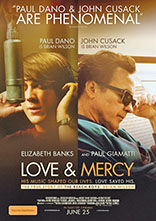In “Love & Mercy” (Roadside), a profile of Brian Wilson, the driving force behind 1960s chart toppers the Beach Boys, director Bill Pohlad focuses on lengthy scenes showing the young Wilson (Paul Dano) laboriously crafting his distinctive sound in recording studios. It’s an intelligent, steady approach.
Accused by his collaborators of lacking a commercial sensibility, Wilson declares, “I got different stuff inside me. I gotta get it out.”
That “different stuff” included Wilson’s drive to break away from synthetic, clean-cut hits like “California Girls” in favor of more ambitious material — such as the group’s 1966 concept album “Pet Sounds.” Yet it also extended to the auditory hallucinations that followed Wilson’s use of psychedelic drugs.
Pohlad isn’t after sensationalism, but rather what used to be described as restrained good taste. So, in order to keep Wilson sympathetic, he ducks explicit portrayals or discussions of substance abuse.
Pohlad portrays Wilson as a deeply sensitive, easily manipulated pawn. In the 1960s, Wilson’s lack of assertiveness leaves him under the thumb of his controlling father, Murry (Bill Camp).
Two decades later, Wilson is held in thrall by abusive therapist Eugene Landy (Paul Giamatti). Claiming his patient has paranoid schizophrenia, Landy keeps Wilson heavily medicated, and restricts the musician’s access to others who might help him.
As portrayed by John Cusack, this burned-out adult version of Wilson is eventually rescued thanks to the compassionate interventions of Melinda Ledbetter (Elizabeth Banks), a car saleswoman Wilson would eventually marry.
Uncomfortable details have undoubtedly been stripped away in the interests of a single, compelling narrative, and both Murry Wilson and Landy become stereotyped villains. Yet “Love & Mercy” can be appreciated for its celebration of one star’s at least partially successful maneuvering through the moral minefield laid down by wealth and fame.
The film contains a premarital bedroom scene, drug use and fleeting instances of profanity and coarse language. (A-III, PG-13).

